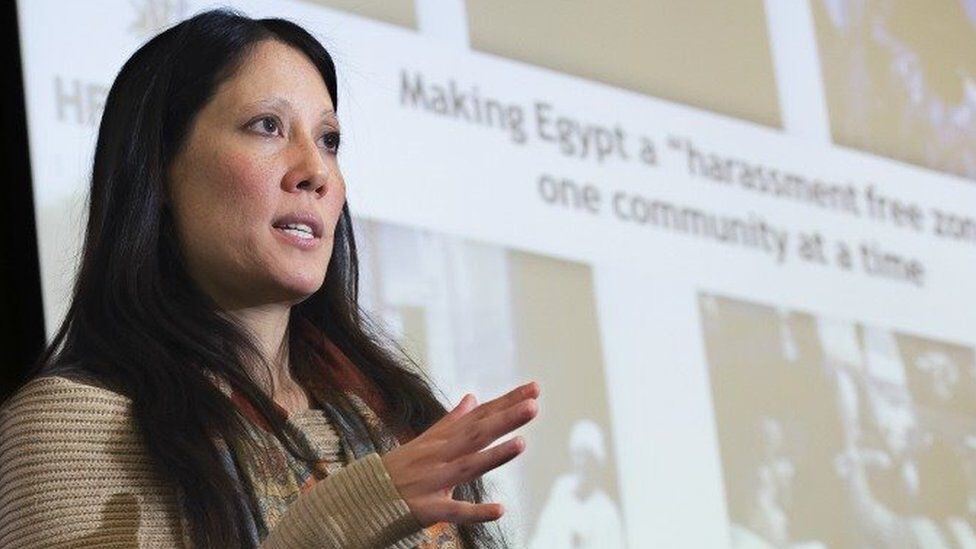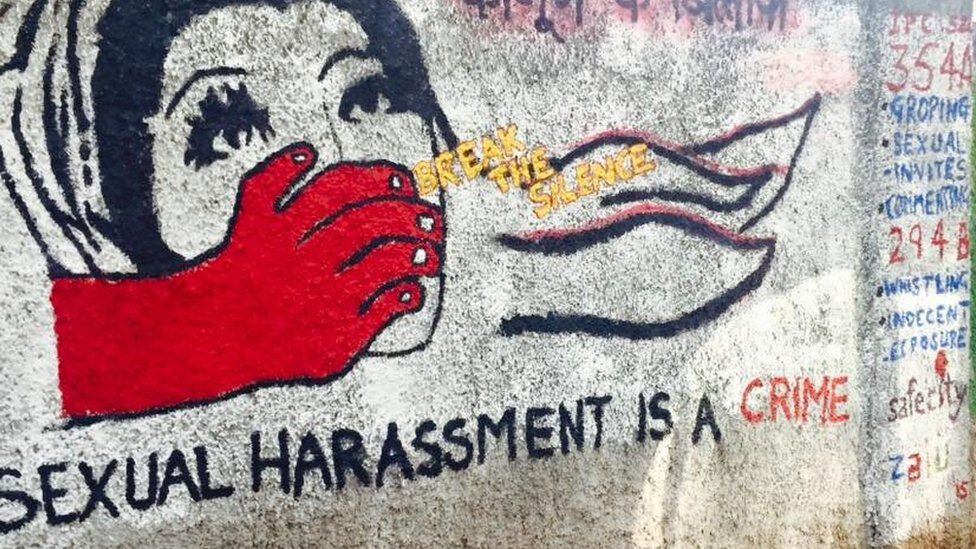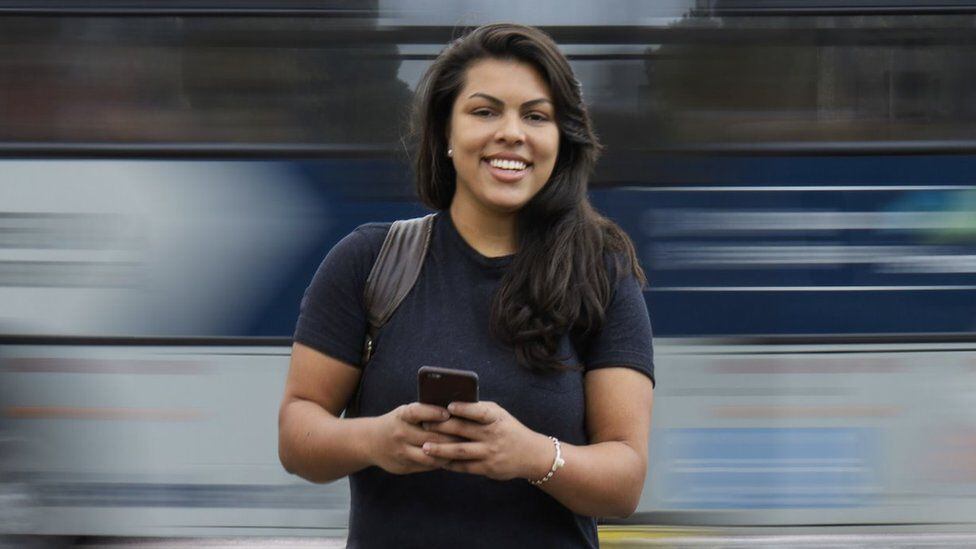Make the streets safer for women.
This is what several projects around the world are looking for, which are using technology to change policies and end bullying.
In the city of Glasgow, Scotland, women are collecting data on their experiences of violence and harassment on the streets.
This is an online map for women to fill out with reports of harassment, including stalking, intimidation, and sexual assault.
“He was about three or four steps behind me and tried to enter my front door when I pulled out my keys,” one user writes, “but when I asked him what he was doing and told him my boyfriend was inside, he ran away.”
The project is run by Wise Women, a community safety network, and aims to identify Top places where bullying incidents occur.
Dawn Fyfe, strategic development worker at Wise Women, hopes to influence politicians and urban planners to make the city a safer space for women.
“We know that harassment and abuse of women is happening in public spaces,” she told the BBC.
“We can use this to provide an informed contribution to strategic approaches to violence against women and influence any change that occurs.”
The data in Glasgow will be collected over three months until March 1, with initial findings shared on International Women’s Day on March 8.
The women behind the project hope that the scheme can be extended and even implemented nationally in the UK in the future.
Harassment Mapping
Aggregating people’s geographic data to create an up-to-date digital map – so-called “crowdmapping” – has already been used in the past to combat street harassment.
In 2010, a group of female volunteers in Egypt created HarassMap, which enables women anonymously report incidents of abuse in public spaces.
- “I was humiliated and intimidated”: the endless trauma of victims of spy cameras in South Korea
A survey at the time by the Egyptian Center for Women’s Rights indicated that 83% of female citizens and 98% of foreign women experienced some form of harassment in public.
“Before we started, there weren’t other people who were linking traditional and digital community work in this area,” says Rebecca Chiao, one of the founders of HarassMap.
“I think we were the first to do that.”
They launched it just before the Arab Spring in 2011, which coincided with a huge spike in social media engagement across Egypt that Chiao says contributed to the success of their platform.
“Just seeing people’s reactions to reading the anonymous reports was amazing,” he recalls.
“Some reports were very emotional or graphic and it was not something that women in Egypt felt comfortable talking about openly, maybe with friends, but definitely not with family or publicly.”
“I was walking alone and a worker kept calling me, looking at me and trying to get my attention. His colleagues also laughed and looked at me,” one user wrote.
Another reported an experience of indecent exposure and intimidation.
“I was walking home at night and a taxi driver pulled up in front of me, got out of the car, unbuttoned his pants and started touching himself. I turned the corner and pretended to go into one of the buildings, and then he drove slowly by. trying to see if he had gotten in.
However, HarassMap no longer collects anonymous reports because the laws in Egypt related to data collection have changed.
Instead, its international arm now advises and supports the launch of platforms in other countries and shares its experience to achieve zero tolerance for harassment in the public sphere and in private spaces.
Chiao says one success story that HarassMap has helped is SafeCity, which started in India and has since expanded to other countries, including Nepal, Kenya and Nigeria.

“A World Problem”
SafeCity was founded by ElsaMarie D’Silva and her friends in December 2012 in reaction to the brutal gang rape and murder of student Jyoti Singh on a bus in Delhi.
“We wanted to do something right away,” explains D’Silva. “It’s a global problem and there’s underreporting everywhere.”
“Tools like SafeCity are a great way to report your experience anonymously, and we believe documenting it is the first step to getting justice.”
The map collects cases of harassment, including photo taking, whistling, indecent display and public masturbation.
“Women often instinctively know that what has been done to them is wrong, but they don’t always know that they have the right to report it,” says D’Silva.
“SafeCity builds a community of support and shared experience. It is a healing document and builds capacity for situational awareness.”
D’Silva says they have taken the data to the authorities and the reaction has been positive to increase the safety of women in critical areas through new measures, including more police patrols and CCTV presence.
“Women and girls feel safer reporting and raising the alarm and can stay out later and do more with their time,” she says.
“The world doesn’t stop at 7pm,” he says.
That’s exactly why, in response to calls from its users, the global route finding app Citymapper now offers routes that may not necessarily be the fastest, but may be the most populated or best lit.
The “Major Roads” feature provides specific options for when traveling after dark.
“More lively and well-lit streets, easy to memorize and to avoid parks and alleys,” Gilbert Wedam, chief designer of Citymapper, told the BBC.
“The ‘best’ route isn’t always the fastest, it depends a lot on the context you’re in.”

Similarly, an entrepreneur in Recife, Brazil, sought to fill the huge data gap on reported harassment in her country and find a solution to make the streets safer.
Simony Cesar is the founder and CEO of GIRLa technology that can be integrated into other apps, including ride-sharing and route planning apps, to enable harassment reporting.
“In the official government data, it’s as if the problem didn’t exist,” he says.
Include women in decision-making
Cesar’s mother worked on a public bus and spoke of how difficult it was for women to travel to and from work.
As Cesar grew up, she herself saw and experienced the reality of harassment on public transport.
“I have met many women who would quit school or their job simply to avoid the fear of public transport,” she says.
A recent survey conducted by a women’s safety net, Instituto Patrícia Galvão/Locomotiva, found that the 81% of women reported experiencing some form of violence in their cities in Brazil.

A public security NGO, Fórum Brasileiro de Segurança Pública, estimates that there are a case of harassment every four seconds on public transport in Brazil.
NINA works by integrating with other applications by providing a button to easily report incidents of harassment or assault, providing data to Cesar and his team.
“The data collected by us is used to prove that there is a real problem,” he says.
“We take the information to the authorities and promote the development of policies that make cities safer, more inclusive and more habitable, especially for women.”
Back in Scotland, UK, Dawn Fyfe highlights the same need for more women’s voices to be heard.
“We want women to be included in decision-making so that their experiences are at the center of solutions in urban planning.”
“It’s plain misogyny and we have to respond to stop it at its root,” he told the BBC.
“We want to bring about change now, enough is enough.”
Now you can receive notifications from BBC World. Download our app and activate it so you don’t miss our best content.
- Do you already know our YouTube channel? Subscribe!
Source: Elcomercio

:quality(75)/cloudfront-us-east-1.images.arcpublishing.com/elcomercio/GE4DCMRNGAZC2MJQKQYDAORRHA.jpg)

:quality(75)/cloudfront-us-east-1.images.arcpublishing.com/elcomercio/E6L53IOUUBDR7CLCSJBN3TQ5M4.jpg)


:quality(75)/cloudfront-us-east-1.images.arcpublishing.com/elcomercio/R3SCFKKATBDIVF7W6HD4SZMEAU.jpg)
